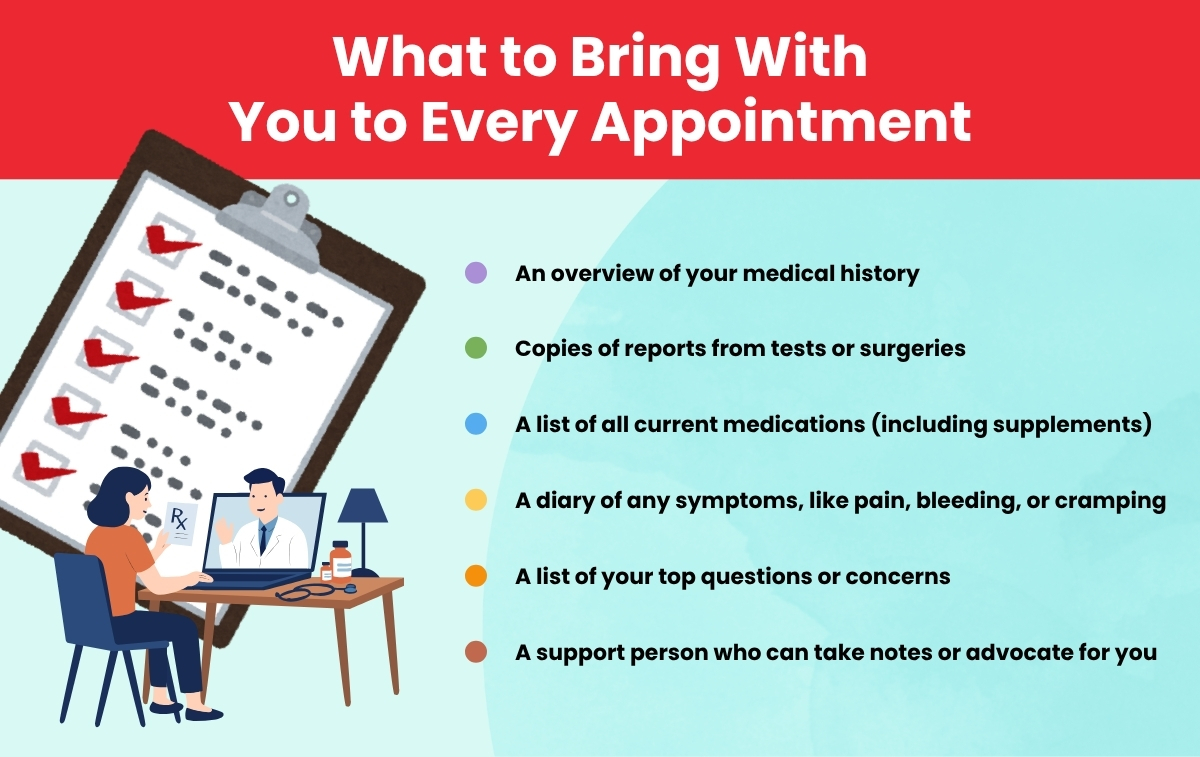Summary:
Endometriosis can be difficult to diagnose, and long wait times can make it difficult to see a specialist in some Canadian cities. Patients can take an active role in their care and advocate for themselves by bringing records, pain diaries, and reports to appointments. Asking for referrals, second opinions, or advice on treatment options like surgery, medication, pain management, and lifestyle changes makes it easier to get your needs met. It also helps to share as much detail as possible.
How to Advocate for Yourself in the Medical System When You Have Endometriosis
Endometriosis is a complex condition that can cause chronic pain, fatigue, and fertility challenges that affect every aspect of your daily life. While awareness about it is growing, you may still face challenges in getting the help you need in the medical system, like long wait times or stigma.
Learning how to advocate for yourself is the best way to make sure your voice is heard in conversations that directly impact your health. Clearly communicating your symptoms, goals, and boundaries for treatment lets you build a better working relationship with your care team, which leads to better outcomes.
This article offers practical strategies and evidence-based information to help you prepare for appointments, explore care options, and feel more confident asking questions about your health.
Talking to Your Doctor About Endometriosis
One of the best ways to make the most of the time you spend with your care team is to prepare for each appointment in advance. It’s easier to talk about your symptoms and how you want to respond to them if you don’t have to struggle to remember every little detail on the spot.
Tracking and Documenting Your Symptoms
Keep a diary of your symptoms and bring it with you to each appointment. Try to write down the date, time, specifics and any noteworthy info, like where you were and what you were doing.
Make a note whenever you experience:
- Fatigue or exhaustion
- Pain or discomfort with bowel movements (dyschezia)
- Pain or discomfort during urination (dysuria)
- Pain or discomfort during sexual intercourse (dyspareunia)
- Changes in diet
- Changes in sleep habits
- Feeling sad or down for more than two weeks
Living with endometriosis can take a toll on your mental health over time. That’s why it’s important to include notes about your emotional and physical well-being.
What to Bring With You to Every Appointment
The items you bring with you to your appointment can help you self-advocate more effectively and ensure you feel supported and heard. It’s helpful to include:
- An overview of your medical history (including any known current or past conditions)
- Copies of pathology, radiology, or imaging reports, if you have access to them
- A list of any current prescriptions, OTC medications, or supplements
- A diary of any symptoms, like pain, bleeding, or cramping
- A list of your top questions or concerns
- A support person who can take notes, hold your hand, or advocate for you
If you have vision or hearing loss, use mobility aids, or need other accommodations due to a chronic illness or disability, you have the right to ask for them. Canadian law also gives you the right to bring your service dog, if you have one, but they might need to wait outside radiology or procedure rooms.
Clarifying the Goals of Treatment
You don’t need to be an endo expert to advocate for yourself in appointments, but having a general sense of what matters to you will help you feel more in control. It will also help you explore your options.
To clarify the goals of your treatment plan, try asking:
- “I’m not sure what my options are yet, but I’d like to understand what comes next.”
- “Pain is my biggest issue right now. What can we do about that first?”
- “What should I expect from the treatment process in the near future?
- “What does long-term treatment for endometriosis typically look like?”
- “Will you be handling my care, or will I need a referral to a specialist?”
- “Can you walk me through all available treatment options?”
It’s okay to ask about specific goals, like fertility or surgery, if you’re already familiar with them. But it’s also fine to keep it simple if you don’t know much about endometriosis yet.
Asking for a Second Opinion or Referral
You have the right to seek a second opinion or a referral to a specialist at any time. If the idea of asking for one makes you feel nervous, you aren’t alone! Many patients worry they’ll offend or annoy their provider by asking, but this is a very normal and valid element of care.
To communicate your needs clearly, try saying:
- “I’d like a second opinion to feel more confident about my next steps. Can you put in a referral?”
- “I’d like to talk to an endometriosis specialist. Is there someone available you can refer me to?”
- “Can you send my records to [clinic or specialist] so I don’t have to repeat everything?”
What to Do If You Get Pushback
Acknowledge their position, then reaffirm your request:
- “I understand your point, but I’d still like a referral.
- “I’d like to get on the waitlist now even if the waitlist is very long.”
- “I’d feel better having at least one appointment with an endometriosis specialist.”
- “I appreciate your care. I’d still like another perspective before making a decision.”
If your provider refuses to refer you to a specialist, ask them to document the refusal and note their reasoning in your chart so you have a clear record of the exchange.
Discussing Surgery With Your Provider
Surgery isn’t usually the first line of treatment for endometriosis, but you can ask about it or explore it as an option at any point in your care. Bringing it up doesn’t mean you have to have a procedure or make any treatment right now.
If You’re Curious About Surgery as an Option
Try asking your doctor:
- “Is surgery an option for treating my endometriosis?”
- “How will having surgery affect my fertility in the future?”
- “What are the risks of having surgery for endometriosis?”
If Your Provider Has Already Recommended Surgery
If surgery is already on the table, these questions can help you understand what to expect and decide whether you’re ready to move forward:
- “Is this surgery the best possible treatment option for my endometriosis?”
- “What is the name of the surgery you’re recommending, and how does it work?”
- “How will having surgery benefit me, reduce my symptoms, or improve my quality of life?”
- “What should I expect recovery to be like, both right after and a few weeks later?”
- “What happens if you find more tissue than expected during surgery?”
- “How likely is it that my symptoms could come back after surgery?”
- “Will I be able to see a report or images afterward so I know exactly what was done?”
- “If I’m not ready to decide today, can I take this information home and think about it?”
You might be feeling unsure or uncomfortable with the proposed plan at this step. Having surgery is a big decision, and even patients who know it’s the best option might feel this way sometimes. Your surgeon will do everything they can to help you make an informed decision about whether it’s right for you.
Questions About Medications and Alternative Treatment Options
Not everyone needs or wants surgery, and that’s okay. Some people prefer to manage their endometriosis with medications, pain management strategies, or lifestyle changes. Understanding your options can help you work with your provider to create a treatment plan that fits your needs and priorities.
Medications
Medications for endometriosis may include hormonal treatments (such as birth control pills, progestins, or GnRH medications) and non-hormonal options (such as NSAIDs for pain). Your provider can help you decide what’s appropriate based on your symptoms, goals, and overall health.
Ask your doctor questions like:
- “What medications are available to help manage endometriosis pain or control my cycle?”
- “How long does it usually take to notice changes after starting this medication?”
- “What side effects should I expect in the short term, and what are the long-term risks?”
- “Are there non-hormonal options, like NSAIDs or other pain relievers?”
- “Will this medication affect my fertility now or later?”
- “If I want to stop or switch medications, how does that work?”
Finding the right medication can take time, and not every one will be the right fit. Always let your doctor know right away if you experience side effects, new symptoms, or if the medication isn’t helping.
Pain Management Strategies
Pain management strategies for endometriosis can include pelvic floor therapy, OTC medications, heat therapy, TENS units, nerve blocks, and sometimes prescription medications. They won’t cure or treat your condition, but can improve your quality of life by making it easier to cope.
Ask your doctor questions like:
- “Could pelvic floor therapy or physical therapy help with my pain or cramping?”
- “Can heat, TENS, or nerve blocks help me manage my pain?”
- “How often can I use heat, ice, or a TENS machines safely?”
- “Is it safe to combine these strategies with my current medications or treatments?”
- “How often can I take Tylenol/Ibuprofen/Aleve/? Can I combine them?
- “What should I do if my pain becomes severe or stops responding to these methods?
You can use strategies like these even if you’re taking medication or planning to have surgery. Your provider can give you guidance on how to use them safely during or after any procedures.
Lifestyle Changes
Lifestyle changes like managing your stress, gentle exercise, eating a healthy diet, and getting enough sleep can help you protect your physical and mental health. They may also help reduce your risk for flare-ups over time.
To explore options like these, try asking:
- “Are there specific types of exercise or activity that can help reduce my pain or fatigue?”
- “Could dietary changes or nutritional support make a difference for my symptoms?”
- “How can I better manage my stress to prevent or reduce flare-ups?”
- “Are there lifestyle habits I should avoid that might make symptoms worse?”
- “Would working with a physiotherapist, dietitian, or other specialist be helpful?”
- “How can I build a daily routine that helps me maintain my energy and mood?”
- “I’m struggling with insomnia because of endometriosis. How can I get more sleep?”
Lifestyle changes can help you feel more in control of your day-to-day health. Small, sustainable changes turn into healthy habits over time that can make it easier to cope with endometriosis.
Complementary and Alternative Therapies
Some people explore additional supports to manage symptoms, like acupuncture, massage therapy, mindfulness practices, dietary supplements, and herbal medicines. Always check with your doctor to make sure they’re safe for you and evidence-based.
To bring them up during appointments, try asking:
- “Is there any evidence that [alternative therapy] helps relieve endometriosis pain?
- “Are herbal therapies and supplements an effective option for supporting my overall wellness?”
- “I heard about/read about [option] on social media/in the news. Does it actually work?”
- “Are there any dangerous or harmful alternative therapies I should avoid?”
- “Is it safe to combine [herbal therapy or supplement] with my current medication regimen?”
- “Do you recommend seeing a [naturopath/osteopath/chiropractor/other provider]?”
Complementary medicine can be an important part of a broader care plan for some endometriosis, but it’s vital to check with your doctor first before trying anything new. Be especially cautious about anything you read about or see advertised online. The claims could be exaggerated, unproven, or even unsafe.
Strategies for More Effective Communication
Being structured and deliberate in your communication can help ensure that you are asking the right questions and giving your provider the information they need to make informed recommendations. See the chart below for helpful tips on becoming a more effective communicator.
| Strategy | Why It Helps | Good Communication | Less Effective |
|---|---|---|---|
| Use concrete language | Gives your provider clear, specific information to work with. | “The pain in my lower abdomen prevents me from standing for more than 10 minutes.” | “It hurts sometimes.” |
| Ask clarifying questions | Ensures you fully understand your options and next steps. | “Can you help me understand why this test isn’t recommended?” | Nodding along even though you’re feeling unsure. |
| Bring a support person | Reduces stress and helps you remember important details. | “This is my support person. They’re helping me keep track of everything we talk about today.” | Going alone even though you’re overwhelmed and have someone who wants to support you. |
| Asking for written notes | Creates a clear record of what was discussed and decided. | “Can I get a written summary or visit notes to review later?” | Relying on memory to remember everything. |
| Use patient portals | Keeps your questions, results, and records organized for easier follow-up or referrals. | “I sent my questions ahead through the patient portal. Did you have a chance to review them?” | Waiting to ask questions until after you forget them. |
*It may not always be possible to write everything down during your appointment due to time constraints. You can also ask for an update via your doctor’s patient portal, email, or snail mail.
Where to Get More Support
Connecting with others who understand what you’re going through and expanding your support network can make it easier to advocate for yourself and navigate endometriosis. You can find support groups, educational info and more at:
- Endometriosis Network Canada: resources for navigating care, peer support.
- CanSAGE: patient-facing resources and a surgeon directory.
- ESHRE: the European Society of Human Reproduction and Embryology provides guidelines for patients on endometriosis and other conditions.
Staying Informed Helps You Work with Your Provider for More Effective Endometriosis Care
Endometriosis care can be complex, but being well-prepared and asking the right questions can empower you and your care provider to work together for the best possible results.
Documenting your symptoms, understanding clinical guidelines, and exploring referrals or second opinions are all appropriate steps. With support from your healthcare team and resources from advocacy organizations, you can take a more proactive approach to improving your quality of life.
To learn more, explore our free videos and resources on endometriosis here.
Download the How to Advocate for Yourself in the Medical System When You Have Endometriosis PDF



